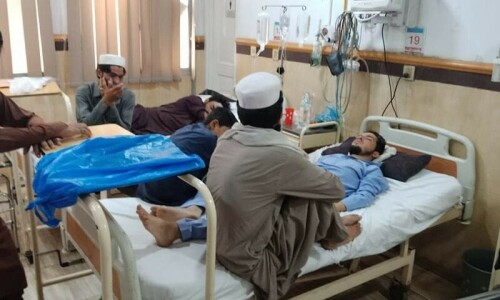ISLAMABAD: No sooner had the 21st constitution amendment been signed into law that a citizen challenged it before the Supreme Court on Wednesday, along with the Pakistan Army (Amendment) Act, 2015, maintaining that both impinge upon constitutional guarantees ensuring the independence of judiciary and the freedom to profess religion.
But instead of asking the court to strike down the amendments, petitioner Maulvi Iqbal Haider pleaded that it examine the constitutional amendment and the amendment to the PAA and provide suitable guidelines after interpreting Articles 2A, 4, 5, 9 10, 14, 19, 20, 21, 22, 21, 25, 70(4), 175, 185, 188, 189, 190, 201, 203 and 204 of the Constitution.
Apparently, the petitioner – who is also chairman of the Awami Himayat Tehreek – seemed cognisant of the fact that constitution amendments cannot be challenged in court. It also appeared that he had kept in mind what the apex court did when a plethora of petitioners had asked that the 18th amendment be declared illegal and unconstitutional. At that point, the court handed down a set of guidelines for the government and subsequently the procedures suggested by the SC were given consideration and incorporated into law through the 19th Amendment.
The petitioner argued that the set of fresh amendments seemed designed to override judgements of the Supreme Court and suggested that if the government really thought that military courts were the only solution to protect the life and liberty of its citizens from militants, then it should have sought the Supreme Court’s opinion by sending a presidential reference under Article 186 of the Constitution, which deals with ‘Advisory Jurisdiction’. This way, the petitioner contended, the apex court’s suggestions would have remained within the basic structure of the Constitution.
Petitioner asks court for guidelines on making military courts part of justice system without overriding past judgements
In the present circumstances, the amendments amount to interfering, obstructing, disobeying and disregarding earlier orders and judgements of the Supreme Court, the petition argued.
Moreover, he contended, the provision went against basic features of the Constitution by requiring military courts to function independently of the high courts or the Supreme Court and also barring the superior courts from sitting in appeal against the verdicts of the special courts. The amendments also violate citizens’ constitutional right to lead their lives in accordance with their own religion, sect and worship according to their own faith. This was against the ideology of Pakistan, the petition pleaded, adding that the terms ‘religion’ or ‘sect’ should not have been used in the amendments since terrorists or militants had no religion.
Letter to CJ
When apprehensions were initially being expressed on the question of establishing military courts, Advocate Nabeel Ahmed Khan had written to Chief Justice Nasirul Mulk to seek the transfer of military-related cases to the Rawalpindi Bench of the Lahore High Court.
The counsel, who represents the convict Nasir Javed Fakhri, expressed the fear that his client might be executed without due process of law, despite the fact that his case was still pending before the high court.
He contended that this case, along with 68 other cases involving military personnel, were improperly transferred from the Rawalpindi Bench of the LHC to the principal seat in Lahore, in violation of Articles 37D and 198 of the Constitution.
Nasir Fakhri was awarded life in prison by a military court on Jan 22, 2011 on allegations of rape, theft and murder in December 2010 in Hyderabad.
Later, the letter alleged, military authorities constituted another court – in an illegal manner – and summarily awarded the death sentence.
Published in Dawn January 8th , 2014
On a mobile phone? Get the Dawn Mobile App: Apple Store | Google Play













































Dear visitor, the comments section is undergoing an overhaul and will return soon.